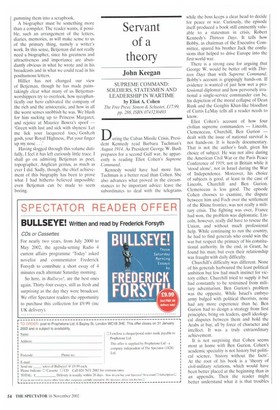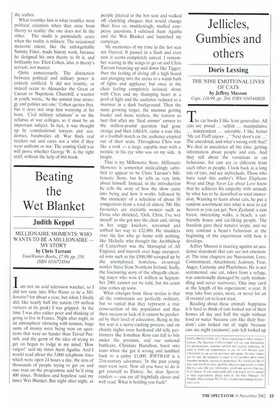Servant of a theory
John Keegan SUPREME COMMAND: SOLDIERS, STATESMEN AND LEADERSHIP IN WARTIME by Eliot A. Cohen The Free Press! Simon & Schuster, £17.99, pp. 288, ISBN 0743230493 During the Cuban Missile Crisis, President Kennedy read Barbara Tuchman's August 1914. As President George W. Bush prepares for a second Gulf war, he apparently is reading Eliot Cohen's Supreme Command.
Kennedy would have had more fun. Tuchman is a better read than Cohen. She also advances what proved in the circumstances to be important advice: leave the subordinates to deal with the telegrams
while the boss keeps a clear head to decide for peace or war. Curiously, the episode itself produced a book still eminently valuable to a statesman in crisis, Robert Kennedy's Thirteen Days. It tells how Bobby, as chairman of the Executive Committee, spared his brother Jack the confusions that helped to drive Europe into the first world war.
There is a strong case for arguing that George W. would be better off with Thirteen Days than with Supreme Command. Bobby's account is grippingly hands-on. If evidence is wanted of just how wet a professional diplomat and how perversely irrational a single-service commander can be, his depiction of the moral collapse of Dean Rusk and the Genghis Khan-like bloodlust of Curtis LeMay tells all a reader needs to know.
Eliot Cohen's account of how four civilian supreme commanders — Lincoln, Clemenceau, Churchill, Ben Gurion — dealt with the issue of national survival is not hands-on. It is heavily documentary. That is not the author's fault, given his choice of subject. He was not alive during the American Civil War or the Paris Peace Conference of 1919, not in Britain while it 'stood alone', not in Israel during the War of Independence. Moreover, his choice of subjects is good, at least in the case of Lincoln, Churchill and Ben Gurion. Clemenceau is less good. The episode Cohen chooses to examine, the dispute between him and Foch over the settlement of the Rhine frontier, was not really a military crisis. The fighting was over, France had won, the problem was diplomatic. Lincoln, however, really did have to rescue the Union, and without much professional help. While continuing to run the country, he had to find generals who could win the war but respect the primacy of his constitutional authority. In the end, in Grant, he found his man; but even their relationship was fraught with daily difficulty.
Churchill's difficulty was different. None of his generals harboured the least political ambition but few had much instinct for victory either. Churchill tried to supply it but had constantly to be restrained from military adventurism. Ben Gurion's problem was the opposite. While Israel's embryo army bulged with political theorists, none had any more experience than he. Ben Gurion had to design a strategy from first principles, bring on leaders, quell ideological disputes between them and hold the Arabs at bay, all by force of character and intellect. It was a truly extraordinary achievement.
It is not surprising that Cohen seems most at home with Ben Gurion. Cohen's academic speciality is not history but political science, 'history without the facts'. At the root of his book is a 'theory of civil-military relations, which would have been better placed at the beginning than in an appendix. Then the reader might better understand what it is that troubles the author.
What troubles him is what troubles most political scientists when they stray from theory to reality: the one does not fit the other. The misfit is particularly acute when the reality is military. The occasional meteoric talent, like the unforgettable Sammy Finer, made history work, because he designed his own theory to fit it, and brilliantly too. Eliot Cohen, alas, is theory's servant, not master.
Quite unnecessarily. The distinction between political and military power is entirely artificial. It did not trouble, or indeed occur to Alexander the Great or Caesar or Napoleon. Churchill, a warrior in youth, wrote, 'At the summit true strategy and politics are one.' Cohen quotes that, but it does not stop him worrying at his bone. 'Civil military relations' is on the syllabus at war colleges, so it must be an important subject. In fact, it was thought up by constitutional lawyers and academics, busybodies all. War finds real readers out and cares not a whit if they wear uniform or not. The coming Gulf war will prove whether George W. is the right stuff, without the help of this book.



























































































 Previous page
Previous page